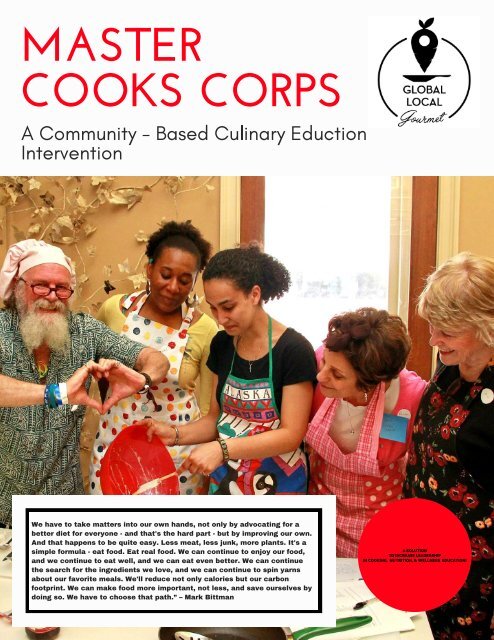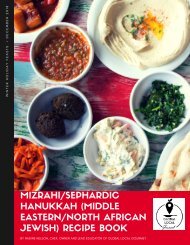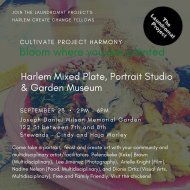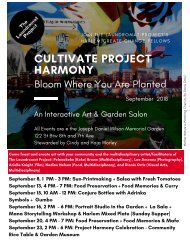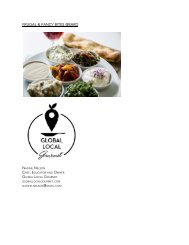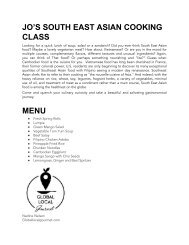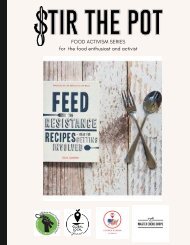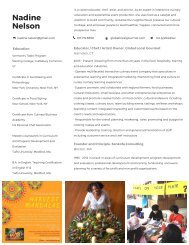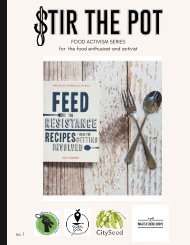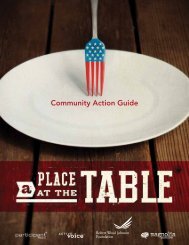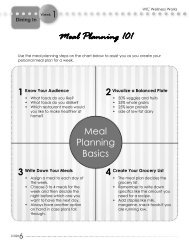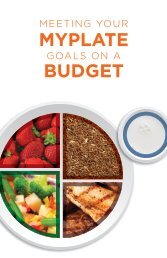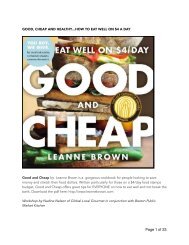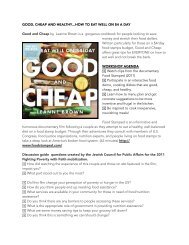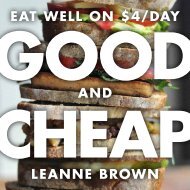Master Cooks Corps (2)
You also want an ePaper? Increase the reach of your titles
YUMPU automatically turns print PDFs into web optimized ePapers that Google loves.
have to take matters into our own hands, not only by advocating for a<br />
We<br />
diet for everyone - and that's the hard part - but by improving our own.<br />
better<br />
that happens to be quite easy. Less meat, less junk, more plants. It's a<br />
And<br />
formula - eat food. Eat real food. We can continue to enjoy our food,<br />
simple<br />
we continue to eat well, and we can eat even better. We can continue<br />
and<br />
search for the ingredients we love, and we can continue to spin yarns<br />
the<br />
our favorite meals. We'll reduce not only calories but our carbon<br />
about<br />
We can make food more important, not less, and save ourselves by<br />
footprint.<br />
MASTER<br />
COOKS CORPS<br />
Community - Based Culinary Eduction<br />
A<br />
Intervention<br />
A SOLUTION<br />
TO INCREASE LEADERSHIP<br />
IN COOKING, NUTRITION, & WELLNESS EDUCATION!<br />
doing so. We have to choose that path.” – Mark Bittman
to cook elevated humans from lone animals into increasingly intelligent, civilized<br />
Learning<br />
and though we spend scant time doing real cooking, we’ve become obsessed with<br />
groups,<br />
arts and wellness are the viability needed to make a difference in our nation's health. With<br />
Culinary<br />
of obesity rising, the top causes of American deaths are related to poor diet. The nation needs<br />
rates<br />
culinary education as a nutrition intervention that stretches across many of the barriers<br />
interactive<br />
prevent healthy eating practices. However, making nutrition principles and healthy cooking<br />
that<br />
accessible is useless without also making them applicable. Therefore, hands-on culinary<br />
easily<br />
outreach programs focused on producing sustainable healthy eating behavior through<br />
nutrition<br />
confidence and nutrition empowerment is a successful approach to begin the restoration of<br />
culinary<br />
country's state of well-being across a variety of areas. Empowering community cooks to share<br />
our<br />
knowledge with their neighbors creates a promising set of tools to promote positive changes in<br />
their<br />
preferences, attitudes, and behaviors of individuals around health, wellness,<br />
food-related<br />
<strong>Cooks</strong> <strong>Corps</strong> is a train the trainer program designed by Nadine Nelson and a service of<br />
<strong>Master</strong><br />
Local Gourmet. For more information, please contact 917- 719-6859 or<br />
Global<br />
MASTER COOKS CORPS<br />
watching people cook--a paradox that points to longing for a lost experience. - Michael Pollan<br />
community, healthy food choices, and cooking.<br />
nadine.nelson@gmail.com and globallocalgourmet.com
one believe that if you give people a thorough<br />
For<br />
of what confronts them and the basic causes<br />
understanding<br />
produce it, they'll create their own program, and when<br />
that<br />
people create a program, you get action. ~ Malcolm X<br />
the<br />
<strong>Cooks</strong> <strong>Corps</strong> is a volunteer community – based cooking training<br />
<strong>Master</strong><br />
program comprised of the most passionate adult and youth<br />
service<br />
which draw from the diversity of the neighborhoods in which they<br />
chefs<br />
because they are the citizens of those communities. <strong>Master</strong> <strong>Cooks</strong><br />
serve<br />
is active on the front lines of a critical nationwide effort<br />
<strong>Corps</strong><br />
address our country's relationship with healthy food, wellness,<br />
to<br />
and using food as a communal building asset. Partnering and<br />
cooking,<br />
with food justice, culinary education, scholastic, medical,<br />
collaborating<br />
helping organizations to stir up solutions to the nation's food issues<br />
and<br />
cooking itself well, makes this work even more enriching and far<br />
while<br />
<strong>Master</strong> <strong>Cooks</strong> <strong>Corps</strong> seeks to create communities of wellness<br />
reaching.<br />
increasing knowledge of, engagement with, and access to healthy<br />
by<br />
to fulfill the overwhelming requests for cooking education,<br />
Created<br />
<strong>Cooks</strong> <strong>Corps</strong> is a scalable solution to the national obesity,<br />
<strong>Master</strong><br />
and preventative disease epidemic. In America where wealth<br />
diabetes,<br />
compound widening health gaps, citizens are at an elevated<br />
disparities<br />
for chronic diseases and many negative health outcomes when<br />
risk<br />
to other nations. <strong>Master</strong> <strong>Cooks</strong> <strong>Corps</strong> addresses the root<br />
compared<br />
of both: lack of culinary education, tools for supporting wellness<br />
cause<br />
change, access and knowledge on how to purchase healthy<br />
lifestyle<br />
<strong>Master</strong> <strong>Cooks</strong> <strong>Corps</strong> curriculum is<br />
The<br />
on Mark Bittman’s essay<br />
based<br />
Fry, Boil: Eating for One or 6<br />
“Chop,<br />
Billion”.<br />
<strong>Cooks</strong> <strong>Corps</strong> members are<br />
<strong>Master</strong><br />
to facilitate teaching<br />
trained<br />
healthy, culturally relevant<br />
about<br />
and how to make wholesome<br />
food,<br />
accessible to everyone that<br />
food<br />
easy to make yet can be prepared<br />
is<br />
a limited budget. They learn to<br />
on<br />
participants where they are at<br />
meet<br />
terms of their food preferences,<br />
in<br />
knowledge, and resources<br />
skills,<br />
in the communities in which<br />
available<br />
live and serve.<br />
they<br />
Heritage Diet Pyramids<br />
Oldways<br />
Mediterranean, Latin,<br />
(Vegetarian,<br />
and Asian) and pedagogical<br />
African,<br />
that support culturally<br />
practices<br />
sustainable, popular<br />
relevant,<br />
and experiential teaching<br />
education<br />
support the curriculum and<br />
also<br />
a culinary pedagogical tool<br />
create<br />
in which to draw from later for<br />
kit<br />
<strong>Cooks</strong> <strong>Corps</strong> Members who<br />
<strong>Master</strong><br />
students from a variety of<br />
teach<br />
in an array of<br />
demographics<br />
MASTER COOKS CORPS<br />
food.<br />
food within one's budget.<br />
settings.
age of Nutritionism has come)…which implies the<br />
(The<br />
for a priesthood. For to enter the world where your<br />
need<br />
salvation depends on unseen nutrients, you need<br />
dietary<br />
of expert help. - Michael Pollan<br />
plenty<br />
is mounting evidence to link the trend of unhealthy dietary<br />
There<br />
with the lack of cooking at home and nutrition education.<br />
habits<br />
with a greater understanding of nutrition naturally eat a<br />
People<br />
mix of vegetables than people with less cooking knowledge<br />
healthier<br />
confidence. Many Americans simply lack the know on how to<br />
and<br />
and prepare foods for wholesome meals. In a study of<br />
purchase<br />
prevention and health promotion, nutrition education<br />
obesity<br />
a much greater emphasis when compared to physical<br />
received<br />
or media education in obesity prevention. Some research<br />
activity<br />
cooking skills are declining, thus compromising the public's<br />
suggests<br />
to prepare nutritionally sound meals. Now more than ever,<br />
ability<br />
crave a better grasp of what wellness really looks, tastes,<br />
Americans<br />
feels like. Moreover, individuals who report being more involved<br />
and<br />
food purchases and preparation or who cook more often, are<br />
in<br />
likely to meet healthy dietary guidelines. With all sorts of<br />
more<br />
for maintaining a nutritious and fit lifestyle, such as<br />
obstacles<br />
of dining out, insufficient time or money, taste leanings,<br />
frequency<br />
and lack of nutrition expertise and skills, designers of<br />
stress,<br />
cooking education programs must expand their scope of<br />
successful<br />
nutrition education and wellness in a nimble,<br />
implementing<br />
WHY IS CULINARY<br />
EDUCATION IMPORTANT?<br />
Cooking is an art and<br />
patience a virtue...<br />
Careful shopping, fresh<br />
ingredients, and an<br />
unhurried approach are<br />
nearly all you need.<br />
There is one more thing<br />
- love. Love for food and<br />
love for those you invite<br />
to your table. With a<br />
combination of these<br />
things you can be an<br />
artist - not perhaps in<br />
the representational<br />
style of a Dutch master,<br />
but rather more like<br />
Gauguin, the naïve, or<br />
Van Gogh, the<br />
impressionist. Plates or<br />
pictures of sunshine<br />
taste of happiness and<br />
love." – Keith Floyd in A<br />
Feast of Floyd<br />
effortless, affordable, and convenient manner.
Each class is structured to encourage several outcomes, in the form of both<br />
•<br />
concepts and interactive cooking-related skills and knowledge<br />
theoretical<br />
Learn to teach delicious, balanced, and easy-to-prepare whole-food, plant-<br />
•<br />
meals sourced locally with cultural humility<br />
based<br />
Understand the influence of dietary patterns on health and illness, and the<br />
•<br />
denominators of good health around the world and what has proven to<br />
common<br />
effective<br />
be<br />
Gain practical tips, customized tools, and menu plans to fit a variety of dietary<br />
•<br />
and cultures<br />
lifestyles<br />
Discover new food preparation skills and cooking techniques that draw out<br />
•<br />
properties and the most flavorful qualities of foods, herbs, and spices<br />
healing<br />
from around the world<br />
inspired<br />
Learn how to teach creativity and flexibility in food preparation<br />
•<br />
Learn how to teach basic cooking techniques including the preparation of grains,<br />
•<br />
the end of this course students will have considered a wide range of ideas<br />
By<br />
to food, allowing them to teach others how to:<br />
pertaining<br />
Understand the life cycle of food, from farm to fork<br />
•<br />
Understand the link between diet and health:how do our dietary decisions affect<br />
•<br />
bodies? our<br />
Understand how to facilitate discussions and activities around the intersections<br />
•<br />
the social/cultural/political/economic/environmental importance of<br />
between<br />
Consequently, how do communities celebrate organize/make a living,<br />
food?<br />
of free, health-promoting, quick-and-easy recipes<br />
•Hundreds<br />
materials, handouts, and worksheets<br />
•Course<br />
TO GLOBAL<br />
INDIVIDUAL<br />
SYSTEMS<br />
FOOD<br />
Goals<br />
<strong>Cooks</strong> <strong>Corps</strong> is a Train-the-trainer<br />
<strong>Master</strong><br />
to prepare instructors to present<br />
program<br />
effectively, respond to<br />
information<br />
questions and lead activities<br />
participant<br />
reinforce learning around teaching<br />
that<br />
process of cooking, wellness, and<br />
the<br />
empowerment. <strong>Master</strong> <strong>Cooks</strong> Corp<br />
health<br />
are equipped to direct<br />
members<br />
to supplementary resources<br />
participants<br />
reference materials. Instructors learn<br />
and<br />
lead discussions, listen effectively, make<br />
to<br />
observations and help<br />
accurate<br />
to link their cooking goals with<br />
participants<br />
instruction. New instructors get<br />
customized<br />
watch an experienced instructor teach,<br />
to<br />
the exercises themselves and<br />
complete<br />
practice teaching segments to other<br />
then<br />
Activities<br />
train-the-trainer workshops, the<br />
During<br />
learn to apply adult learning<br />
participants<br />
principles. Additionally, activities<br />
theory<br />
instructors to build relationships<br />
prepare<br />
participants. For example, the<br />
with<br />
in a train-the-trainer workshop<br />
facilitator<br />
an ice-breaker welcome activity<br />
conducts<br />
show participants how to get people to<br />
to<br />
themselves. Each participant<br />
introduce<br />
to say his name, his expectations<br />
stands<br />
his current expertise level with the<br />
and<br />
Practice<br />
instructors receive coaching<br />
Inexperienced<br />
mentoring from experienced teachers<br />
and<br />
facilitators. The seasoned personnel<br />
and<br />
the less experienced in developing<br />
guide<br />
skills and knowledge they need to<br />
the<br />
the course themselves. For<br />
deliver<br />
they provide tips and techniques<br />
example,<br />
observing a new instructor teach<br />
by<br />
segments and then offer<br />
program<br />
feedback. Additionally, an<br />
constructive<br />
instructor might produce<br />
experienced<br />
and video recordings<br />
audio<br />
themselves teaching the sessions. These<br />
of<br />
may also help new instructors<br />
recordings<br />
to use presentation<br />
learn<br />
kitchen tools and other<br />
equipment,<br />
associated with running a cooking<br />
logistics<br />
or experiential culinary instruction<br />
demo<br />
or workshop.<br />
activity<br />
MASTER COOKS CORPS<br />
TRAINING OBJECTIVES<br />
WHY IT WORKS<br />
COURSE HIGHLIGHTS<br />
participants.<br />
fruits, vegetables, and proteins and where to buy them inexpensively in your area<br />
TRAINING LEARNING OUTCOMES<br />
topics.<br />
nourish themselves around food?<br />
CULINARY EDUCATION RESOURCE ACCESS<br />
•Ongoing support network and online community<br />
DIAGRAM OF FOOD
notion of culturally responsive<br />
The<br />
is premised on the idea that<br />
education<br />
is central to student learning.<br />
culture<br />
to Gloria Ladson−Billings, " It is<br />
According<br />
approach that empowers students<br />
an<br />
socially, emotionally,<br />
intellectually,<br />
and politically by using cultural<br />
artistcally,<br />
to impart knowledge,<br />
referents<br />
and attitudes." The use of cultural<br />
skills<br />
in teaching bridges and explains<br />
referents<br />
mainstream culture, while valuing and<br />
the<br />
the students' own cultures. If<br />
recognizing<br />
want to create change in behavior,<br />
we<br />
someone's cultural ties to<br />
understanding<br />
is important. In teaching cooking and<br />
food<br />
it is imporatant to look at culture<br />
wellness<br />
a variety of perspectives that impact<br />
in<br />
decisions and how to approach<br />
food<br />
instruction to impact the students<br />
culinary<br />
are teaching .<br />
you<br />
instruction is more than just a<br />
Culinary<br />
or basic cooking technique, with a<br />
recipe<br />
philosophy that is based on the<br />
teaching<br />
benefits of cooking as a<br />
educational<br />
to teach many themes and<br />
catalyst<br />
beyond food. Cooking is a<br />
concepts<br />
dimensional learning possibility<br />
multi<br />
opportunity. Food education is<br />
and<br />
to inspire people to learn and<br />
designed<br />
themselves creatively in the kitchen<br />
express<br />
and the kitchen at home, while<br />
classroom<br />
traditional learning disciplines.<br />
reinforcing<br />
this in mind, classes incorporate a<br />
With<br />
range of subjects: history, geography,<br />
wide<br />
reading, social studies, nutrition,<br />
math,<br />
science, foreign<br />
wellness,<br />
culture, and art all find a place<br />
language,<br />
the kitchen.<br />
in<br />
culinary nutrition outreach<br />
Hands-on<br />
focused on producing<br />
programs<br />
healthy eating behavior<br />
sustainable<br />
culinary confidence and<br />
through<br />
alertness are a successful<br />
nutrition<br />
to begin the restoration of our<br />
approach<br />
health. Experiential education is<br />
nation's<br />
philosophy that informs many<br />
a<br />
in which educators<br />
methodologies<br />
engage with learners in<br />
purposefully<br />
experience and focused<br />
direct<br />
in order to increase<br />
reflection<br />
develop skills, clarify values,<br />
knowledge,<br />
develop people's capacity to<br />
and<br />
to their communities.<br />
contribute<br />
and all that is related to food<br />
Cooking<br />
gardening are inherently hands - on<br />
like<br />
on observation and experience.<br />
based<br />
1<br />
CULTURALLY RELEVANT<br />
CULINARY INSTURCTION<br />
THE PEDAGOGY OF<br />
COOKING<br />
2 3<br />
EXPERIENTIAL<br />
TEACHING<br />
ART OF TEACHING COOKING<br />
WORDS OF WISDOM<br />
One of the greatest pleasures of my life<br />
has been that I have never stopped learning<br />
about Good Cooking and Good Food. - Edna<br />
Lewis<br />
Cooking is an art, but all art requires<br />
knowing something about the techniques and<br />
materials. – Nathan Myhrvold<br />
Cooking demands attention, patience, and<br />
above all, a respect for the gifts of the<br />
earth. It is a form of worship, a way of<br />
giving thanks. – Judith B. Jones<br />
Cooking is an observation-based process that<br />
you can’t do if you’re so completely focused<br />
on a recipe. – Alton Brown<br />
This is my advice to people: Learn how to<br />
cook, try new recipes, learn from your<br />
mistakes, be fearless, and above all have fun.<br />
-Julia Child<br />
You cannot get an influence from the cuisine of a<br />
country if you don’t understand it. You’ve got to<br />
study it. – Chef Ferran Adria
of the traditional framework of<br />
Instead<br />
hosting expensive third-party<br />
organizations<br />
to conduct workshops, <strong>Master</strong> <strong>Cooks</strong><br />
providers<br />
trains local leaders to deliver an<br />
<strong>Corps</strong><br />
hands-on curriculum in their schools,<br />
interactive<br />
churches or community centers through<br />
camps,<br />
lens of unique food culture. Cooking<br />
the<br />
are effective at improving food-related<br />
programs<br />
attitudes, and behaviors among<br />
preferences,<br />
and adults, when people understand<br />
adolescents<br />
programs are starting to link<br />
Innovative<br />
medicine, healthcare and healthy<br />
preventative<br />
along with culinary education. Health<br />
eating<br />
who are trained to empower their<br />
professionals<br />
by knowing how to talk to them about<br />
patients<br />
nutritional health and ways to improve it<br />
their<br />
diet can give patients practical advice<br />
through<br />
recipes—to help meet diet and nutrition<br />
—even<br />
rather than relying solely on clinical<br />
goals,<br />
(or, most commonly, little nutrition<br />
knowledge<br />
can produce classes exponentially by<br />
You<br />
your in house talent. By training<br />
training<br />
leaders to deliver the<br />
organizations’<br />
you build capacity within<br />
curriculum,<br />
that are already reaching<br />
organizations<br />
communities and add value to the<br />
vulnerable<br />
work already being done<br />
comprehensive<br />
minimal resources. This sustainable<br />
requiring<br />
targets and collaborates with<br />
approach<br />
that want health education but<br />
organizations<br />
have the resources to hire outside<br />
don’t<br />
to come in and lead continual<br />
trainers<br />
faith communities, hospitals, and<br />
Schools,<br />
can be instrumental in growing<br />
organizations<br />
food and educating people about<br />
fresh<br />
food. - Bryant Terry<br />
sustainable<br />
COOKING TEACHERS,<br />
NUTRITIONISTS, WELLNESS<br />
FACILITATORS, DIETITIANS<br />
MASTER COOKS CORPS TRAINING IS<br />
GOOD FOR COOKING UP WELLNESS<br />
AND FOOD JUSTICE:<br />
where their students are coming from.<br />
DOCTORS, NURSES, & HEALTH<br />
CARE PROFESSIONALS<br />
“<br />
knowledge at all).<br />
HELPING PROFESSIONALS,<br />
COMMUNITY LEADERS,<br />
PARENTS<br />
programming.
is killing us. We need a revolution. Cooking<br />
Convenience<br />
food is a revolutionary act. — Dr. Mark Hyman, NY<br />
real<br />
bestselling author, family physician, and international<br />
Times<br />
in the field of Functional Medicine.<br />
leader<br />
The simple but profound way in which such valuable information<br />
-<br />
presented.<br />
was<br />
I liked learning about different cultures through food.<br />
-<br />
The overall integration of cooking, community, and life.<br />
-<br />
I loved learning about the Oldways Pyramids. This was<br />
-<br />
new to me. And although I am a seasoned cook, and<br />
completely<br />
hundreds of seasonings, I was not familiar with the cultural<br />
have<br />
profiles.<br />
food<br />
I learned how to incorporate misc. veggies into basic ingredients<br />
-<br />
were tasteful and time conscious!<br />
that<br />
Using limited ingredients<br />
-<br />
The improvisational element of the cooking portion and<br />
-<br />
with technical errors!<br />
troubleshooting<br />
Being spontaneous and flexible.<br />
-<br />
Experiential aspect of the program; compilation of easy tips and<br />
-<br />
and flavor combinations.<br />
strategies<br />
The different heritage diets and flavor profiles. Being judgment<br />
-<br />
about people’s cultures. Offering solutions as options. Being<br />
free<br />
mindful of others’ cooking limitations.<br />
really<br />
Learning how much is possible to accomplish with limited<br />
-<br />
reserves -- learning to “make it work!”<br />
cooking<br />
Working, collaborating in groups with others that all have various<br />
-<br />
strengths.<br />
Interchangeable ingredients across cultures.<br />
-<br />
chance to cook with others creatively to cook with existing<br />
-The<br />
ingredients!<br />
Bridging the cultural gap between people and food.<br />
-<br />
Teachers modeling teaching and getting to critique and roleplay<br />
-<br />
WHAT WAS THE MOST<br />
HELPFUL/RELEVANT TO YOU?<br />
ourselves.
Spruill is a <strong>Master</strong> <strong>Cooks</strong> <strong>Corps</strong> success story. She<br />
Serena<br />
to the program as one of those community unsung<br />
came<br />
who had participated in some of the cities<br />
heroes<br />
food justice firsts. She was part of the inaugural<br />
Maverick<br />
of citizens to start the first farmers market in New<br />
group<br />
over 20 years ago. She also was part of the<br />
Haven,<br />
around the first community garden. In 1980 she<br />
organizing<br />
a vegetarian and then vegan after stumbling on<br />
became<br />
vegetarian co-op and thinking it would be good for<br />
the<br />
health. A mother of 5 and a former wife, Serena has<br />
her<br />
an active citizen most of her life. She has not been<br />
been<br />
difficulties, dealing with depression and<br />
without<br />
after her divorce. She has been a client of<br />
schizophrenia<br />
Mental Health and has used food as a tool<br />
Connecticut<br />
help in her healing process. She is now a Peer Support<br />
to<br />
and helps to cook nutritious food for clients in<br />
Specialist<br />
cafeteria to help rid their diet of processed food and<br />
the<br />
meals that are healthy and local. She leads groups<br />
cook<br />
workshop around recipes where clients get a bag of<br />
and<br />
ingredients of what they have cooked in class.<br />
the<br />
came to <strong>Master</strong> <strong>Cooks</strong> <strong>Corps</strong> very unassuming<br />
She<br />
somewhat shy. Her confidence has been<br />
and<br />
as she has gone from assisting classes<br />
transformative<br />
leading them. She just graduated from The Natural<br />
to<br />
Institute studying raw, vegan, and plant-<br />
Gourmet<br />
food preparation. She is a regular on local<br />
based<br />
sharing her passion for food and teaching<br />
television<br />
her vibrant smile. She is ready to take on the<br />
with<br />
world as the leader she has always been. Her<br />
food<br />
is infectious as she spreads her<br />
personality<br />
for healthy eating with the mental health<br />
knowledge<br />
and beyond. We can’t wait to see where<br />
community<br />
culinary journey will take her because she is just<br />
her<br />
She has attributed her courage and<br />
beginning.<br />
to the mentorship, facilitation, and<br />
motivation<br />
of the <strong>Master</strong> <strong>Cooks</strong> <strong>Corps</strong> program.<br />
guidance<br />
like hers, inspire us to continue to coach and<br />
Stories<br />
the next round of community culinary<br />
teach<br />
ready to whip up solutions for overall<br />
instructors<br />
in the spaces they live.<br />
wellness<br />
SERENA'S SUCCESS<br />
STORY
Ingredients<br />
medium carrots<br />
6<br />
small onion<br />
½<br />
large lemon<br />
1<br />
Materials<br />
small bowls • Box grater •<br />
2<br />
board • Measuring cups •<br />
Cutting<br />
spoons • Medium bowl<br />
Measuring<br />
M O R O C C A N C A R R O T<br />
S A L A D<br />
Tablespoons canola oil<br />
3<br />
teaspoon or tablespoon curry powder (to taste)<br />
1<br />
teaspoon salt<br />
½<br />
teaspoon ground black pepper<br />
¼<br />
cup dark or golden raisins (optional)<br />
¼<br />
Directions<br />
1. Rinse and peel carrots and onion.<br />
2. Shred carrots with a grater. Dice onion.<br />
3. Rinse lemon and cut in half. In a small<br />
bowl, squeeze juice. Discard seeds.<br />
4. In a medium bowl, combine carrots and<br />
onions.<br />
5. In a second small bowl, combine oil, curry<br />
powder, salt, pepper, and 2<br />
Tablespoons of the lemon juice. Mix well. Let<br />
marinate 5 minutes.<br />
6. Pour liquid mixture over carrots and<br />
onions. Stir in raisins. Mix well.<br />
Chef’s Notes<br />
• Replace half of the carrot with grated<br />
jicama or apples.<br />
• For best taste, allow flavors to blend before<br />
serving. Let sit 15–20 minutes after<br />
you have mixed in the sauce in step 6.<br />
• Serve as a colorful side dish for fish,<br />
poached chicken, or baked or broiled<br />
chicken legs.<br />
• Layer onto a sandwich with lean turkey and<br />
fresh veggies like cucumber.<br />
By Chef Nadine Nelson for Share Our<br />
Strength's Cooking Matters Cookbook
Education, and other Factors that<br />
Nutrition<br />
Eating Patterns<br />
Influence<br />
practice of cooking was once lauded as the quintessential avenue<br />
The<br />
which to teach students everything from physics and math to<br />
with<br />
and biology, to geography and art. The legacy of war, feminist<br />
chemistry<br />
a burgeoning industrialized food system, and the rise of<br />
backlash,<br />
foods pushed the study of food and cooking out of our<br />
convenience<br />
and our kitchens. Only one-third of the population know how to<br />
schools<br />
and more than half of our food dollars are spent with other people<br />
cook<br />
our meals. The deskilling of our cooks can be tied to the<br />
preparing<br />
in obesity and diet-related disease, a degradation of local food<br />
increase<br />
suspect working conditions for food workers, and<br />
communities,<br />
and its related practices (producing, preparing, etc.) represent so<br />
Eating<br />
more than simply a means to nourish the body. As we have heard<br />
much<br />
“we are what we eat.” What we eat does matter and we need<br />
universally,<br />
take this matter into our own hands by educating people about the<br />
to<br />
of food production in our country. Inspired by the belief in the<br />
reality<br />
of food knowledge and cooking skills, <strong>Master</strong> <strong>Cooks</strong> <strong>Corps</strong><br />
importance<br />
and pedagogical methodologies was designed with hopes that<br />
curriculum<br />
food education movement will gain traction spread throughout<br />
the<br />
households via institutions like school, church, hospitals, libraries<br />
American<br />
other organizations that can support a <strong>Master</strong> <strong>Cooks</strong> <strong>Corps</strong> cohort<br />
and<br />
we do best is equip schools, health professionals, and other<br />
What<br />
organizations with a set of interactive culinary instruction<br />
community<br />
to meaningfully engage with a variety of constituencies about<br />
strategies<br />
nutrition, and wellness. These pedagogical practices are easy and<br />
food,<br />
to implement while very effective in inspiring enhanced food literacy<br />
fun<br />
with the average person. We want to make healthy, culturally<br />
skills<br />
instruction available for communities to create more sustainable<br />
relevant<br />
"well" environments through interactive culinary education.<br />
and<br />
<strong>Cooks</strong> <strong>Corps</strong> is a train the trainer<br />
<strong>Master</strong><br />
designed by Nadine Nelson and a<br />
program<br />
of Global Local Gourmet. For more<br />
service<br />
please contact 917- 719-6859 or<br />
information,<br />
and<br />
nadine.nelson@gmail.com<br />
globallocalgourmet.com<br />
EXPANSION OF CULINARY NUTRITION<br />
environmental instability.<br />
and program.


